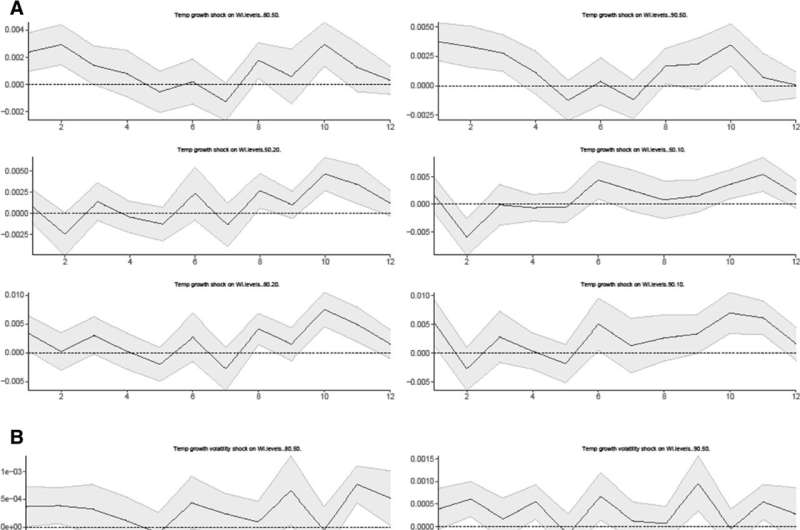This article has been reviewed according to Science X's editorial process and policies. Editors have highlighted the following attributes while ensuring the content's credibility:
fact-checked
peer-reviewed publication
trusted source
proofread
Poor UK households more vulnerable to climate shocks, says new research

Poorer households in the UK are more vulnerable to climate change because temperature shocks are associated with deepening wealth inequality, according to new research published today in the journal Environmental Science and Pollution Research.
Researchers from Anglia Ruskin University (ARU) and institutions in South Africa and Germany examined wealth inequality data against climate date from the period 2006-2018 to ascertain the impact of both temperature changes and climate shocks, such as extreme heat, on wealth inequality in the UK.
The study used wealth inequality data from the Office of National Statistics, while monthly temperature data was collected from the Met Office, using year-on-year temperature growth and its volatility shocks as measures of climate risk.
The study found that both temperature growth and extreme temperature events have positive and statistically significant effects on all measures of wealth inequality in the longer term. This was particularly pronounced when comparing the 10% wealthiest households with the 10% poorest.
It also found that climate risk shocks harm the poorest the most relative to the richest households, exacerbating long-term wealth inequality. Researchers believe this could be because of several factors, including the impact on health of poorer people due to increased air pollution and the effect on food supply chains.
The study also found that show that, upon the impact of climate shocks, wealth inequality increases significantly between the 20% and 10% wealthiest households compared to the households of median wealth, while also reducing the inequality between the average household and the poorest.
Lead author Dr. Xin Sheng, Associate Professor in the Faculty of Business and Law at Anglia Ruskin University (ARU), said, "Even within higher-income countries, poorer people can also be more vulnerable to the impact of climate change. For example, the UK recorded the highest number of heatwave deaths in 2020, and also has among the highest level of income inequality in relation to other developed countries in Europe."
"The findings highlight the disproportionate increased burden of climate change on households that are already experiencing poverty, particularly households in high-climate risk areas. For example, climate change can pose a serious health threat through food insecurity and increased toxic air pollution. Extreme weather can affect crop production, which can push up food and fuel costs."
"As such, measures to mitigate the adverse effects of climate change need to be tailored so as not to overburden the poor."
More information: Xin Sheng et al, Climate shocks and wealth inequality in the UK: evidence from monthly data, Environmental Science and Pollution Research (2023). DOI: 10.1007/s11356-023-27342-1
Journal information: Environmental Science and Pollution Research
Provided by Anglia Ruskin University




















